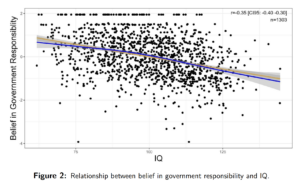https://www.goodreads.com/book/show/2404700.The_IQ_Controversy_the_Media_and_Public_Policy
The I. Q. Controversy The Media and Public Policy Stanley Rothman 323p_0887381510
I read this becus i want to do a follow-up study like this. Both analyzing media output and doing another expert survey.
—
I had been thinking about using PCA on political questions to see any obvious underlying structure. Basically, I want to do OKC questions style. Gather lots of questions, have lots of ppl answer them. Do PCA, see what results are.
Political perspective was assessed in two ways. First, respondents stated their agreement or disagreement with a series of six political statements. The statements dealing with U.S. economic exploitation, the fairness of the private enterprise system, affirmative action, the desirability of socialism, alienation caused by the structure of society, and the propriety of extramarital sexual relations. Responses to these statements were discovered, in a previous investigation incorporating many more such statements, to load highly on a factor representing overall political perspective.6o Agreement was assessed on a 4- point scale, where I was “Strongly agree” and 4 was “Strongly disagree.” For four of the six statements, the mean response is approximately at indifference. Respondents are somewhat more likely to disagree that “The United States would be better off if it moved toward socialism” and that “The structure of our society causes most people to feel alienated.” The second measure of political perspective asked experts to indicate their global political perspective on a 7-point scale, where I was “Very liberal” and 7 was “Very conservative.” Mean self-assessment on this scale is 3.19 (s.d.: 1.28, r.r.:95.6%), putting this expert population slightly to the left of center.
Factor analysis of responses to the six statements and the global rating reveal that all questions, with the exception of the statement about extramarital affairs, load highly on a single factor (i.e., are highly correlated). The five statements and the global rating were therefore normalized and combined to form a political perspective supervariable. It is this variable that is used as a measure of overall political perspective. Note that the liberal position on the five included statements (e.9., belief in socialism, affirmative action, economic exploitation) can all be characterized as placing a higher value on equality of outcome than on economic efficiency.
This tactic has been used before, even if only on a limited set of political opinions.
–
While few would argue that intelligence and aptitude test scores do nor affect self-esteem and motivation, the magnitude of this influence is difficult to measure. There have been many reports of significant positive correlations between test scores and self-concept, motivation, or expectancy, but causality remains ambiguous.rs rhe evidence seems to indicate, however, that the influence of test scores on these affective variables is probably not large. (Causation in the opposite direction may not be very significant either, as the correlation may reflect the influence of a third variable, students’actual level ofability and success in school.) Brim and his associates found that high school students tended to greatly overestimate their own intelligence, as measured by test scores. This was particularly true of students with low scores. Fifty percent of students thought their scores were too low relative to their actual level of ability, while 45 percent thought their scores were accurate. only 7 percent ofthe students reported lowering their self-estimates of intelligence as a result of their test scores, while 24 percent raised their estimates.16
Dunning Kruger, but much earlier.
Reference 16 is: Orville G. Brim, Jr., ‘American Attitudes Towards Intelligence Tests,” American Psychologrsl 20 (1965):125-130; Brim et al. 17. Goslin, p. 133
